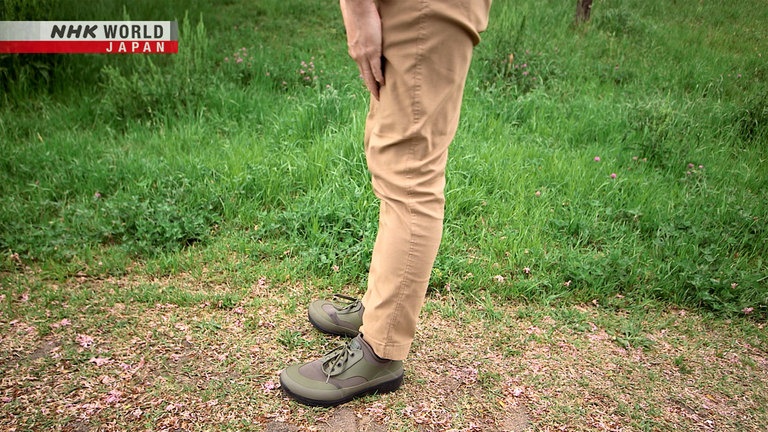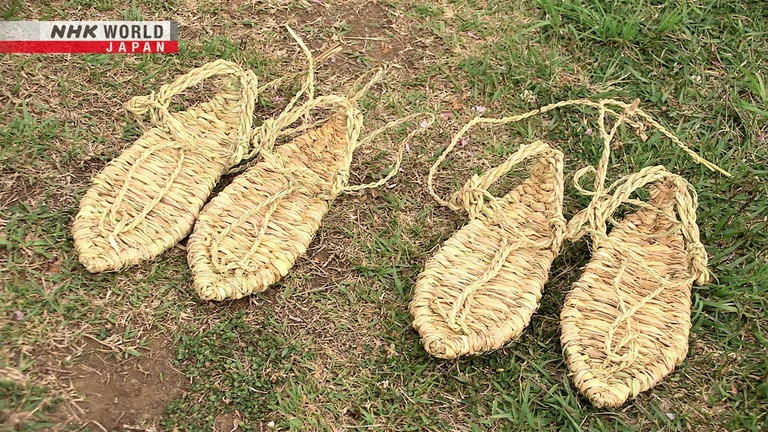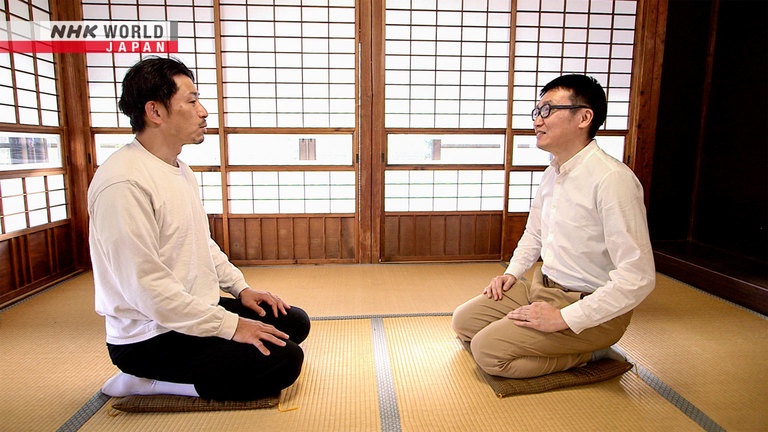Foot and Leg
The Japanese language is rich in words and expressions influenced by nature, history and culture. This episode introduces words related to ashi, which means both foot and leg. They have many important pressure points and play a significant role in blood flow. They've even been called the "second heart." We follow poet, literary translator and long-time Japan resident Peter MacMillan as he takes a walk around his home in Kyoto Prefecture. He guides us through unique words and expressions along the way.




Transcript
"Yukigesho."
"Karakurenai."
The Japanese language is rich in unique expressions that reflect nature and culture.
Magical Japanese.
Today's theme is "ashi," which means both foot and leg.
They have many important pressure points, and play a significant role in blood flow.
They've even been called the "second heart."
Today we'll look at Japanese words and expressions related to the legs and feet.
Hello, I'm Peter MacMillan.
You just caught me in the middle of some "aotake-fumi," an ancient Japanese health practice.
Stimulating the feet and moving the body is important for our health, isn't it?
I know!
Why don't we go on a hike today?
I love a good walk.
Japanese travelers during the Edo Period might walk 30 to 40 kilometers in a single day,
to get from one lodging town to another.
That's just truly amazing!
At the time, the "samurai" class rode horses or traveled in palanquins,
but the only means of transportation available to the common folk was their own feet.
Perhaps as a reflection of this fact, there are a lot of expressions related to feet, starting with...
"Ashi o hakobu."
"Hakobu" means "to carry," and it typically refers to the transport of objects or things.
However, the expression "carry your feet" is used figuratively to describe a person making their way somewhere.
"Ashi o hakobu."
"Ashi o hakobu."
In old Japan, there was an occupation for those who used their legs and feet to go the distance.
"Hikyaku."
"Hi" means "flying," and "kyaku" is another word for leg.
"Hikyaku" were express messengers in the Edo Period who carried urgent letters, documents, or packages on foot.
The roughly 490-kilometer journey from Edo or modern-day Tokyo, to Kyoto,
took about two weeks for the average traveler.
But "hikyaku" used a relay system, that enabled them to cover the distance in just three to four days.
In Japan today, there's a sport called "ekiden," which is essentially a long-distance relay race.
It's said to have been inspired by the hardy "hikyaku" of old.
To be a "hikyaku" must have been awfully hard work!
I'm so glad that I can use my smartphone to send e-mails.
If I had to use my legs in the same way as a "hikyaku,"
I would probably use the following expression.
"Ashi ga bo ni naru."
"Bo" means "stick."
"Ashi ga bo ni naru" translates as "legs turning into sticks,"
and expresses how one's legs can feel stiff or wobbly from exhaustion,
after walking or standing for too long.
By the way, Edo Period Japanese people didn't wear shoes like the ones we wear today.
They wore these when they traveled.
These sandals are called "waraji,"
and they were made by weaving together straw and other plant materials.
Pass the cord of straw rope between your toes, then wrap the rest of the cord around your ankles and tie it.
In this way, the sandals are securely tied to the foot, making them very useful for travel.
"Waraji" give us the following expression.
"Nisoku no waraji o haku."
"Nisoku" means "two pairs," and "haku" is "to wear."
Similar to the English expression, "he wears two hats," it means that someone has two occupations,
that wouldn't usually go together, like two pairs of straw sandals worn at once.
He seems crazy busy recently.
He's working as a cram school teacher
and a pro wrestler.
He's someone who "nisoku no waraji o haku," wears two hats.
"Nisoku no waraji o haku."
"Nisoku no waraji o haku."
Unlike modern-day shoes, "waraji" left the feet uncovered,
so feet must have gotten quite dirty, as people traveled the unpaved dirt roads on foot.
Lodges would have a wash basin at the entrance, so that travelers arriving at the end of a day's walking
could take a seat and wash their feet before entering.
That is where we get the following expression.
"Ashi o arau."
"Arau" is "to wash."
The expression "wash one's feet" means to clean up one's act and quit a job, lifestyle, or habit,
that is considered offensive or objectionable.
"Ashi o arau."
"Ashi o arau."
In many Western countries, it's customary to keep one's shoes on in the house,
whereas in Japan, we usually take our shoes off at the entrance.
This may be because it's not so common to lie or sit on the floor in Western countries,
whereas the tradition in Japan is to put beddings directly on the floor.
Perhaps above all, you can keep your house clean.
Feet are closely associated with the feeling of getting dirty,
and that is why there are certain rules of etiquette in Japan,
that say you must not step on a futon, or walk by the pillow of a sleeping person.
We also have the following expression.
"Ashi o mukete nerarenai."
"Ashi o mukete nerarenai" literally means: "I cannot sleep with my feet turned towards someone."
You can use this saying to express your feelings of gratitude towards someone to whom you are indebted, like this:
Congratulations on becoming
a pro wrestling champion!
It's all thanks to my coach.
I "ashi o mukete nerarenai," to him.
- owe a debt of gratitude
To go to the trouble of making sure your feet are not pointed towards that person,
even if you are far away from each other, and it's the middle of the night when you're both asleep,
this is a way to express not only your gratitude, but also the respect and esteem you hold for them.
This expression tells you a lot about the Japanese mentality.
"Ashi o mukete nerarenai."
"Ashi o mukete nerarenai."
This part of the leg, the knee, is called "hiza" in Japanese,
and I absolutely love this next expression.
"Hiza o majieru."
"Majieru" means "join together."
The expression depicts two people sitting knee to knee for a chat.
"Hiza o majieru."
"Hiza o majieru."
This day has left my legs feeling exhausted, as in "ashi ga bo ni naru."
Remember?
How about we "hiza wo majieru" and have a nice cup of tea?
Ooh, my legs are sore...
See you next time!
Bye!
Oh, that's hot!
Bye!